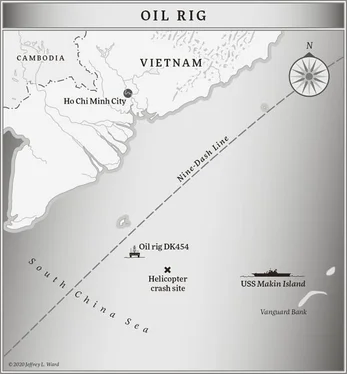“Okay, then,” Clark said. “Midas, you’re with me. You get to be my nurse.”
“Now, Mr. C.,” Midas said. “No hard feelings, right?”
Clark gave him a narrow grin. “Time provides the sweetest revenge. You’ll get old yourself one day, youngster—barring any unforeseen circumstances …”
“Well, shit,” Midas said. “Nice knowing you guys …”
“How will you get us in?” Clark asked.
“I have a contact with Immigration and Visas in Beijing,” Yao said. “A low-level functionary who helps me get visas on short notice. I never ask him for anything sensitive. He’s an unwitting agent—has no idea he’s helping out the evil American. As far as he knows, he’s doing me a favor and acting as a middleman to help rich Canadians who want to tour China without all the red tape. I helped him out of a little jam involving some video of him and his boss’s wife a few years ago, so he feels some amount of indebtedness toward me.”
“Let me guess,” Ryan said. “You’re the one who took the video in the first place?”
“I’ll leave the honey traps to the Chinese,” Yao said. “But I may have taken advantage of a situation that my asset got himself into on his own—”
“Canadian tourists,” Midas said. “So what’s our cover?”
“You’ll go in separately,” Yao said. “John will be retired, out seeing the world. Midas, I’ll set you up as a former Canadian Forces officer, since you have that military bearing anyway. Easier to explain if it’s in the open. Your girlfriend is a doctor.”
“Girlfriend?” Midas said.
“She was supposed to meet you in Kashgar,” Yao said. “But she got called away at the last minute and wasn’t able to make it. I’ll have tickets for her as well, to backstop the story in the unlikely event anyone checks. Your rich girlfriend is paying for the trip anyway, so you figure you’ll just take advantage of the vacay and see the sights.”
“A kept man with a sugar mama,” Clark said, a little smugly. “I can see that.”
Midas groaned. “So this is how it’s gonna go. I make one little joke …”
“Wherever we all end up,” Chavez said, bringing everyone back on track, “we’re likely going in slick. Traveling with a weapon once we’re inside the PRC is one thing, smuggling one in on short notice is almost impossible.”
Yao spoke again. “Depending on where we go, I should be able to outfit us up with some light weapons once we’re in. John, one of my contacts can set you and Midas up as well.”
“There’ll be plenty of weapons lying around Kashgar,” Clark said.
“A lot of Silk Road influence,” Midas noted. “Cleavers and long butcher knives …”
“Pretty sure my contact can do a little better than a meat cleaver,” Yao said. “I’ve seen to it that she has a number of useful items in her arsenal in the event any of my friends happen to stop by with the right introduction.”
“And we’ll have the odd Chinese pistol,” Clark said. “Probably used by old Chiang Kai-shek himself, and maybe a Kalashnikov or two we can commandeer if the need presents itself. The way I hear it, Kashgar is going to be big fun—like Indiana Jones, except with People’s Armed Police and XPCC goons instead of Nazis.”
“That’s on the nose, John,” Adam Yao said. “Remember what I said about the boot on the neck of their people. According to my contacts on the ground, there are a couple of things going on with Medina Tohti’s sister that you should know.”
14
Ten-year-old Hala Tohti chewed on the embroidered collar of her loose cotton shirt while she chopped onions with the oversized cleaver as if her life depended on it. The cleaver was four times as big as her small hand, but she was used to the work and wielded it like an expert. Her uncle had always kept the cleaver razor sharp, before he’d been hauled away by the Bingtuan bastards, and he’d not been gone long enough for it to lose its edge. Everyone knew the Bingtuan. Teachers, police, farm superintendents: Anyone with power was part of the Bingtuan—even the man who ran the petrol station where Hala’s aunt filled up her scooter. Hala was not sure what a bastard was, but her aunt had used it to describe the two men from Kashgar City government who’d visited her home every week for over a month, so it must have meant something ugly.
Hala had chewed on her collar when she was nervous for as long as she could remember. Now, since her father was dead and her mother had run away, the only time she stopped chewing was when her aunt gave her a swat.
Zulfira was only twelve years older, barely twenty-two. To Hala, she felt more like an older sister than an aunt. Zulfira’s husband had been taken away two months earlier, to the same place they’d taken Hala’s father. No one had heard from him since that night. The fat Bingtuan bureaucrat named Mr. Suo told Zulfira that her husband had been detained and sent for reeducation because of something the authorities had found on his phone. One of the Three Evils—terrorism, separatism, and religious extremism—but they never said which one.
Hala’s uncle had been a quiet man who kept to himself. He paid his taxes without complaint, and was not overly religious. Even at ten, Hala knew the only “evil” he’d committed was being married to a pretty woman who fat Suo, the bureaucrat pig, wanted for himself.
Mr. Suo’s assistant was not much older than Zulfira, with sickeningly red lips and eyes that drooped as if he smoked hashish—or was simply bored with everything going on around him.
Suo and his assistant had surprised Hala and her aunt earlier that morning, before daybreak. Hala recognized the electronic beep when Suo’s assistant used his handheld machine to scan the barcode beside Zulfira’s photograph and trustworthiness rating posted beside the front door. Zulfira said the men had to make a record to prove to someone higher than them in the government that they had checked on all the Uyghur homes in their area.
They’d come unannounced six times in as many weeks after Zulfira’s husband was taken, always on some pretense—plastering the barcode on the door or checking the water quality from the kitchen tap—smelling, but not actually tasting it—and finally checking the structure of the house. The water often came out of the tap brown, and there were many cracks in the wall plaster, but Suo and his assistant ignored all those problems. The Bingtuan had condemned Zulfira and her husband’s comfortable old home in an old section of Kashgar and promptly bulldozed it to the ground.
The visits were always a surprise. Each time they’d come, fat Mr. Suo had stood on the front step with his hands behind him and asked if he and his companion could come inside. This morning, the men simply scanned the door code and barged in as if it were their home.
They looked surprised and disappointed that Zulfira and Hala were already out of bed and up working. Fat Suo said he needed to look at the walls again, paying special attention to the bedroom, picking up Zulfira’s blankets and putting them to his nose when he thought no one was looking. The younger man licked his freakish lips and looked oddly at Hala.
Suo turned suddenly, leaving the house without a word. The assistant had made a note in his small book and told Zulfira that he and his boss would return that evening. She would be well advised to have a hot meal prepared. She was, he said, to treat them as family, for that is what they were to be. The young man barked when he spoke, like someone who worked for the person in charge and thought that made him in charge as well. He never introduced himself, but Hala had heard the fat bureaucrat call him by name.
Ren.
Ren the bastard, Zulfira said, though Hala still did not quite know what that meant.
Читать дальше











![Александр Ирвин - Tom Clancy’s The Division 2. Фальшивый рассвет [litres]](/books/417744/aleksandr-irvin-tom-clancy-s-the-division-2-falsh-thumb.webp)
